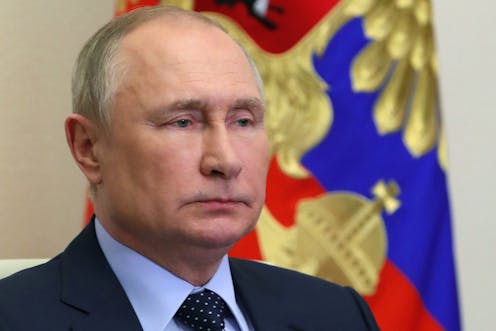How long can Vladimir Putin hold on to power?
- Written by The Conversation

As the war in Ukraine drags on and sanctions start to bite, key questions are being asked. How long can President Vladimir Putin remain in power? Will he be overthrown in a palace coup, as recent rumours have suggested? And can the system of centralised rule he built outlast him?
We can find neglected answers to these questions in the Russian Constitution. This document, and its forgotten importance to Putin’s authority, suggest that although Putin is likely to remain in office in the short term, Russia faces significant long term instability.
Russian crown-presidentialism
The conventional story of Putin’s grip on the presidency rightly points to his informal power over Russia’s elites, grounded on his training in spycraft. But these accounts forget the central role of formal constitutional rules in keeping Putin at the top.
The story starts almost 30 years ago, amid the ruins of the collapsing Soviet Union. After Russia nearly descended into a civil war in the autumn of 1993, then-President Boris Yeltsin made key changes to the working constitutional draft.
He did not change the provisions protecting individual rights, but he did insert rules that created the basis for a vastly powerful presidency, one that could dominate both formal and informal politics. This “crown-presidential” constitutional design has undermined Russian democratic state-building ever since.
In the 1990s, Yeltsin and his Western supporters saw these powers as a necessary expedient, a kind of “democratic battering ram” able to make the difficult (and often unpopular) choices seen as necessary for building free market economics. Yeltsin used these constitutional powers to pursue neo-liberal economic reforms and wage a brutal war in Chechnya.
But, constrained by the West and some of his advisors, Yeltsin also decentralised power to the regional governors and tolerated a pluralistic media. Focusing on these checks on presidential power, as well as the long list of rights and democratic guarantees in the constitution, most observers and commentators declared Russia to be a young democracy.
This all changed in 2000, when Vladimir Putin became president. Declaring a “dictatorship of the law”, Putin empowered central legal institutions to enforce Russia’s constitutional system of presidential dominance.
Read more: How can Russia's invasion of Ukraine end? Here's how peace negotiations have worked in past wars
This allowed Putin to assert personal control over the oligarchs and the regional governors. It also allowed him to monopolise television media, giving him control over the type of political information being given to the Russian people.
Since then, Putin has continued to rely heavily on the constitutional order to maintain his personal power. In the aftermath of the fraudulent 2011 election, Putin used his control over prosecutors and courts to crack down hard on a growing opposition movement.
In 2020, he changed key provisions in the constitution to further consolidate personal control over Russian politics. These presidential powers remain a critical aspect of his personal power today.
What does this mean for Russia’s future?
This central role of constitutional law in Russian governance tells us a great deal about Russia’s future. In the short-term, the vast powers granted to the office of the president will ensure Russian stability, allowing Putin to retain loyal associates and remove any dissenters.
However, in the long-term, these presidential powers will foster Russian instability. The personalisation of power in this kind of system has already weakened institutions (such as the Russian military) and triggered poor decision-making (such as the decision to invade Ukraine). These problems will worsen.
Read more: What can the West do to help Ukraine? It can start by countering Putin's information strategy
The question of who will replace Putin will also trigger a bitter and destabilising struggle to gain control over the Russian presidency. A post-Putin Russia must change these constitutional rules to not only build democracy, but also ensure long-term stability.
Moreover, the fact the West backed this constitutional system in 1993 shows how much we have to learn about the centrality of constitutional provisions ensuring checks and balances on presidential power in ensuring democracy and human rights.
Read more https://theconversation.com/how-long-can-vladimir-putin-hold-on-to-power-181500







